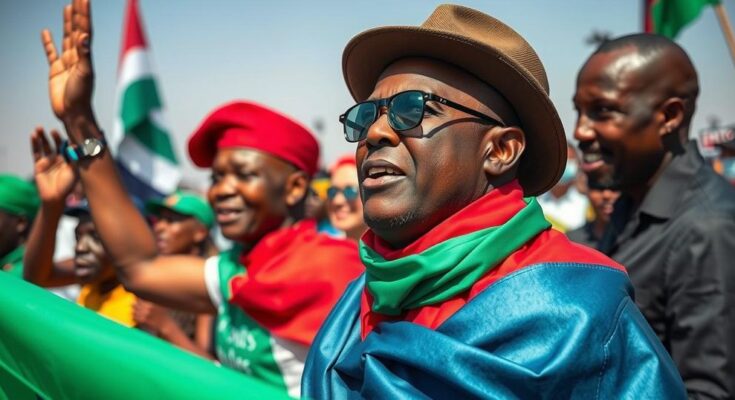Namibia’s ruling party, Swapo, maintained its leadership in the presidential election with 57% of the vote, yet its parliamentary presence has significantly weakened, losing 12 seats. This trend reflects a broader electoral crisis facing incumbent governments across sub-Saharan Africa, driven by economic woes and rising public intolerance towards corruption. Major shifts have occurred in countries like Botswana and Mauritius, where opposition parties have gained ground amidst increasing citizen mobilization for political accountability and reform.
Namibia’s ruling party, Swapo, has retained power for over 30 years, albeit with a diminished authority amid a troubling trend for incumbents in Africa. The Swapo candidate, Netumbo Nandi-Ndaitwah, won the presidential election with 57% of the votes, making history as the first female leader of Namibia. However, the opposition contests this outcome due to reported logistical issues and electoral irregularities. Notably, Swapo’s share of the presidential vote increased while it suffered its worst parliamentary performance, losing twelve seats to remain barely above a majority.
This electoral phenomenon reflects a broader pattern across sub-Saharan Africa this year, indicating a significant challenge for ruling parties. Various factors—economic decline, corruption, and the rise of assertive opposition—have led to dramatic losses for established governments. Several countries witnessed landslide defeats, including the Botswana Democratic Party, which, after ruling since independence in 1966, saw a drop from 38 to just four parliamentary seats.
Mauritius faced a similar upheaval, with the governing Alliance Lepep coalition reduced to merely two parliamentary seats as the opposition Alliance du Changement took control of 60 out of 66 seats. Similarly, in Senegal, the release of opposition leaders just before elections contributed to a historic victory for the opposition party. Even where governments clung to power, such as South Africa’s African National Congress, they did so after significant losses, losing the majority and entering coalition arrangements.
This year, citizens have increasingly demanded accountability, as evidenced by growing public anger over corruption and economic mismanagement. Rising living costs have exacerbated discontent, sparking protests across various nations, including Kenya. This notable unrest in Africa mirrors global trends, where inflation and economic woes triggered political upheaval in nations like the UK and the US.
Notably, opposition parties in Africa have successfully learned from past experiences, adopting strategies designed to safeguard the electoral process and present united fronts against ruling parties. This shift may foreshadow potential challenges for the New Patriotic Party in Ghana’s upcoming election, and similarly complicate matters for the Malawian government’s prospects in 2025. If Ghana experiences a transfer of power, 2024 could mark a record year for opposition victories in sub-Saharan Africa.
The recent elections in Namibia highlight a significant political shift within the context of sub-Saharan Africa’s complex electoral landscape. Ruling parties across various nations have faced unprecedented challenges since economic downturns and increasing public dissatisfaction with corruption and governance have emerged as pivotal issues. Observations from this election cycle suggest a growing trend toward democratic resilience, as citizens mobilize to demand accountability from their leaders, indicating a potential shift in political power dynamics across the continent. The implications of these elections rising to the attention of scholars and policymakers underscore the need for a reassessment of Africa’s political landscape, particularly in the face of global democratic backsliding.
The developments in Namibia and other African nations underscore a pronounced shift in political dynamics as ruling parties face mounting pressures from increasingly organized opposition forces and a disillusioned electorate. The combination of economic difficulties, corruption concerns, and ineffective governance have galvanized public sentiment toward demanding change. As more nations head to the polls, these patterns suggest a landmark year for democracy in Africa, indicating a potential resurgence of political accountability and a reevaluation of established political powers.
Original Source: www.bbc.com




